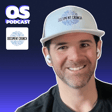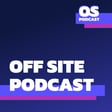Become a Creator today!Start creating today - Share your story with the world!
Start for free
00:00:00
00:00:01

E 31 CEO of innDex on what makes implementation successful
In this episode, Carlos & Jason are joined by George Smithies, CEO of innDex.
The three discuss the trigger moments that sparked creating technological solutions to construction issues, and how real-life experience of construction projects makes a world of difference in implementing new software for teams.
Transcript
Introductions and Episode Overview
00:00:00
Speaker
Jason you know when like a qs goes to site and they're in like perfectly clean gear from head to toe and everyone's like oh what's this guy doing here your headphones are so shiny it's like it's your first day they are they are glossy i had i had five minutes before this i thought i'd just polished them up for you shine them um the old shoe i don't know what's shinier but headphones are your or your skull there we go there we go i think you led me into that
00:00:43
Speaker
Hello and welcome to episode 31 of the Offsite podcast where we chat all things construction and technology. My name is Carlos Cavallo and I'm Jason Lancini. G'day Carlos, how are you going? Pretty good thanks. How are you doing? I well, I'm slightly under the weather. I haven't had a massive night or anything. It's the joys of a toddler. It's a new illness every week and this week it's I'm losing my voice.
00:00:54
Speaker
Yeah, I'll take that.
00:01:07
Speaker
That is a spectrum. Getting ill from a toddler or a Monday night out in town. That is two different types of people there.
00:01:15
Speaker
Anyone that knows me knows it definitely wasn't the night out. But for those that don't know, it wasn't. For sure. Right. So today we have a guest on the pod. I've done my usual LinkedIn stalk to put together a bit of an intro. So today's guest is a chartered civil engineer. His previous sort of life was an agent for contractors like Valkovitz Patrick and Costain.
00:01:44
Speaker
Custom was actually part of the Bond Street team for a little bit of time, which I wasn't aware of. He's a Forbes 30 under 30, which must be a wicked accolade for your Tinder profile. And he's the co-founder of Index. Most of you guys were known as George Smithies. Great to have you on the podcast, mate. How are
Meet George Smithies
00:02:07
Speaker
you? Very good. And yeah, what an intro. Just really young to me before we even started.
00:02:14
Speaker
Talk to us a little bit about the Forbes 30 under 30. How does that work? Oh, Jesus Christ. Yeah, no, I get a lot of stick for this. And when you guys will have seen the media recently, it's not looking good for all of us. Lots of lots of time being done. Really? Well, I mean, Sam Bangman freed. Yeah.
00:02:37
Speaker
So yeah, I'm getting a lot of sticks without the moment. Good fun. I think it's one of those things the longer you wait, the more you've got a chance of making like 30 under 30 is real hard than 40 under 40 at like one's a bit 50 under 50. Like that 90 under 90 is where I'm trying to get it.
00:02:54
Speaker
How far off are you? I'm actually updating your LinkedIn profile when you're 90 with that. So George, I guess to kick off and set the scene a bit, can you tell us a bit about what Index does?
What is Index and its Origins?
00:03:12
Speaker
Yeah. So, I mean, like you introduced me, I'm civil engineer of a trade and then Aaron, my co-founder civil engineer as well. I was horizontal build. He was vertical build. Um, so I was more the sort of the civil as the road, the rails, that sort of stuff. And our, our just pure frustrations around, you know, people, construction sites, how we communicate, how we have value, getting an extract and detail out of these people who are actually on the jobs and given the value to the.
00:03:38
Speaker
you know, the people sat back in the office. So Index was around that data capture, it started around the induction process. It was all around, you know, if we know our people better, we know how they qualify, we know how they experience, you know, where they live, can we deliver projects better? And that's where it all sort of started, really.
00:03:54
Speaker
So we boil that down and you're going to have to forgive me because I'm a QS, not an engineer. So my sight. My interaction with this is slightly different. I'm normally just querying people in numbers.
00:04:11
Speaker
Yeah, but luckily we get paid double the engineer. So it works out fine. So you obviously go through this induction process. So you grab the details of these individuals, you can provide them information like during their tenure on site. But then is it also the sort of swipes and understanding who's where, where and everything else and tying that back to records?
00:04:29
Speaker
Yeah, absolutely. Absolutely. Which, you know, for yourself, you know, your record keeping, all that sort of stuff is perfect. So, you know, you can be hitting your suppliers as you probably do on a daily basis. But, you know, what was that? Work with our suppliers.
00:04:46
Speaker
Yeah, yeah, yeah, yeah, yeah. That collaborative approach, right? I mean, look, it's more than just, you know, big brother, we're watching you, time records. It's, you know, that fatigue piece. You know, are people working too many hours? Are we overworking people? Are we causing ourselves danger? You know, Index is a health and safety platform at its heart, but it's really trying to help
Index's Impact on Construction Sites
00:05:10
Speaker
that person down on the ground, you know, achieve a job in a better way, a quicker way, but also in a safer way. Um, you know, if we can build a profile up of each individual and start to really understand, you know, what lets and what allows it to tick, you know, why, why are they not producing, you know, the outputs that we were hoping of them last week? You know, how can we improve that? How can we put, approve our supply chain? How can we improve our, our main contracts? And then how can we improve sort of, you know, our frameworks and things like that as well. So there's a lot going on.
00:05:40
Speaker
The fatigue piece, especially with megaprojects, obviously they pretty rapidly change between like standard shifts, triple shifts, night shift. So for individuals to be able to manage that, yeah, seems like a useful, yeah, useful part. I noticed you got two products. So what we just spoken about the index side, and if so, what's Recquedex? Yeah, so we haven't really spoken much about Recquedex yet at all. So Recquedex was basically born out of
00:06:09
Speaker
As you guys probably know, you're down with site teams and you're talking to them and you're trying to work out, you know, what's working, what's not working, how can we improve? And what we started to realize is that allowing suppliers of labor to get into projects in a way that was managed properly, very transparent, equal opportunity to all suppliers is really, really difficult. So these big mega projects, which, you know, you guys work on H2 and things like that,
00:06:39
Speaker
Being able to get that labor into these projects is really, really quite difficult. It's normally you pick up the phone and you know, you might have five lads here on Monday. You might, you might not, you might have them following Monday. And it was trying to create a tech layer that basically manages that process. So it's really, really boring, you know, about boring. We thought inductions was boring. Like this is, this is the whole new level. Okay. As you elevate a filter index.
00:07:06
Speaker
That always grabs everyone's attention. I saw your guys' eyes light up. You're like, right, okay, tell me more.
00:07:14
Speaker
Cool. Um, and, uh, just one or two more questions before I let Jason jump in. So, um, your typical sort of customer and typical deployment, are you working with like logistics induction sort of safety teams initially to sort of bring you guys in early doors before you start inducting onto
How Does Index Engage with Clients?
00:07:30
Speaker
a project? Is that how it works? Is that who you sort of interacting with? Yeah, absolutely. So, I mean, tip, I mean the perfect, perfect person we go into as helpful safety director.
00:07:40
Speaker
Yeah, we start channeling away there, sort of showing some of the value, get a trial demo project, sort of set up with them, allow them to see the outputs and then build a sort of business case to roll it further. Yeah, that would be our perfect approach. Sometimes, you know, we'll come in, a project team level will be recommended by someone else. And that's very much the way in which we like to work. It's through recommendation existing.
00:08:03
Speaker
news as people going out and just sharing the love. We don't really do that outboundy sales stuff. You know, I don't know, question back to you guys, you know, how does that work? You know, do you do outbound stuff? Or is it natural? You know, construction is very natural. Everyone knows everybody. It's, you've heard of this, you've heard of that, introduces this person, that sort of stuff. So, you know, that's how we like to roll. Yeah, it's definitely like a industry that's ripe for referrals. It's relatively small people talk. And there's just a few main contractors that everyone bounces between.
00:08:33
Speaker
Cool. And typically are you guys sort of building infrastructure a bit of both? Yeah. I mean, we started in the rail because of my bike running rail. You know, we've gotten a couple of crossroad jobs and that's where we kicked off. Then, you know, based on the market, really, you know, we got quite a lot of sort of logistics centers, big sheds, basically. Got a load of data centers more recently.
00:08:57
Speaker
We still do do a fair bit of sort of civils infrastructure. It really does just depend on Yeah, who's passed on the recommendation and where we end up We're not we're pretty agnostic with the types of work that we work on really cool
00:09:13
Speaker
Jason. Sorry, George. I'm always super interested in like the, the moment, lots of people in construction constantly talking about how they see this problem. They see that problem. They've had this idea of this. They've had an idea of solving it some other way. I'm always super intrigued and impressed with the people that actually go and do it.
00:09:41
Speaker
So if I can take you back to like the, the moment you guys started out.
00:09:46
Speaker
Like what was, what was the thing that, you know, what was it like? What got you to make the decision? Did you have some like early pilot projects that really helped you get things rolling? What was sort of the impetus? If you imagine you're talking to someone, I've had a couple of meetings recently with folks who forgot these ideas, they're working for contractors and they want to know how to like make it, like take that first step out of
The Birth of Index: From Frustration to Solution
00:10:10
Speaker
there. What was that for you, you guys?
00:10:13
Speaker
Yeah, no, I mean, it's, you know, I remember it very, very well. He, you know, originally I was, I was working for Volkers and I was really enjoying what I was doing there. I was like, you know, I'm going to climb the ladder here and I'm going to, I'm going to do really, really well. And pure frustration just around how much paperwork I hated. I hated tech. You know, I, I hated the fact we were trying to bring in, which still forms and all this sort of stuff. And I was just like,
00:10:38
Speaker
crap because you have to do it three times and all this sort of stuff. Um, so anyway, that, that sort of parcel by, I ended up going out to Uganda for three months, just to like do a bit of work and stuff like that out there and sort of spend a bit of time just sort of thinking about things and then came back and thought, right, I need to, I need to earn some money now. Um, so I went down to bond street because Costein were paying quite well down there, uh, a bit of contract work.
00:11:01
Speaker
Are you a Bond Street alumni as well are you? Well yeah I think Carla see you Bond Street as well. I was Paddington. Right, Jason it was you who was Bond Street.
00:11:22
Speaker
How was the melting pot, was it? Mate, honestly, I turned up there and I sat in an induction room until two o'clock in the afternoon. And I thought, this is the one. This is what I'm going to go out. So that was it. Yeah, it was as simple as that. I spoke to Aaron, he was on the oversight development at Tottenham Court Road. And we met for lunch, I think, that day or the next day and just said, right, let's go and build this. And that's where it all kicked off from, most of them.
00:11:49
Speaker
So inductions are reductions like your hero product. That's what you get to. That's really like the starting point for, for like new customers. Original name. Yeah. I want to know what I want to know the index origin story as well, but what's the original name? So when we started, it was called induct me talk about me. Yeah.
00:12:17
Speaker
Yes and suggestive. That was our only product. Yeah, no one exactly has. It's a bit of a strange thing really. So yeah, so anyway, yeah, going on to your question. So we started with Induct Me and we'd create this logo, right? That was an eye with a man's head and helmet on it. They'll be like, we can't call it this. So we had, obviously that is an issue. What a bloody hell. So we've got to start with an eye.
00:12:43
Speaker
We've got to have a capital letter in there somewhere. How are we going to do it? And then we were like, okay, how about innovative and data exchange debt. We were like banging. Let's do it. That's it. Okay. Yeah. Nice. That gives you all sorts of options. That's perfect.
00:13:02
Speaker
Exactly, you know, you could go anywhere with that. Exactly. And so yeah, going back to that, like, so you started, you were like, yep, this is what we're going to go after. Inductions are like the hero product. Did you go and like build it and then go try and sell it? Or was it like you had a couple of projects and you, you sort of built around their requirements?
00:13:24
Speaker
Yeah, so we had a couple of projects. We had Ilford Station over in East London, which was my old employer managed to convince an old boss of mine to give it a go and kick it about and see what he thought and it fell apart many times. Yeah, we've been there. And then we had a couple of others, actually suppliers who I'd worked with before, just asking them, will they give it a bit of a kick around as well? And they did and they fed back.
00:13:54
Speaker
Yeah, I guess for that first year, we really had a product that didn't really add any value, but with that feedback loop coming in and we've been saying that feedback loop, you know, that's really biggest part about our business is spending time with our client base. Everybody who's employed index that's like client facing is, you know, ex-construction. So yeah, they're section engineers, they're site managers, they're project managers, those types of people who
00:14:20
Speaker
when they turn up they know how to how to talk to people to start off with but also you know when someone's explaining a problem an issue actually understanding that issue and being able to articulate it's yeah really really important. And so as a product you are you're providing this sort of almost like an integration layer with imagine some element of interface or UI and you're you're connecting to
00:14:47
Speaker
Are you like, like, let's take like a gate access type thing. Are you connecting to what the customer already has? Are you recommending a product? Are you, how far in that, like how vertically integrated is, are you now and what's the aspiration, I guess.
00:15:03
Speaker
Yeah, so we will do everything. We'll do it end-to-end if the customer wants. And I'd say probably 75% of our projects probably are end-to-end, but then we'll also work with, say they've got a security company they work with. We can either retrofit or we can just literally plug our software straight into whatever type of maybe biometrics or whatever they've got set up. And then we also have for your rail projects where maybe you've got, say,
00:15:31
Speaker
40 access points along 50 kilometers of rail. You just use a geofence and facility then for those which can just be done on anybody's phone, a tablet, that sort of stuff. Cool. Carlos, I saw you were going to jump in there. Yeah, I'll try to have the old hand raise feature. Very far. In terms of the information that you gather on individuals that are joining a site,
00:15:54
Speaker
And I appreciate there's going to be all sorts of rules between like contractors and even sites, but is that information, once you gather it, is it like cross project transferable? Okay. So just to be clear, you interrupt, you come in and ask my question that I was literally going to ask.
00:16:10
Speaker
I know we hadn't planned the questions, but like I was thinking the same thing. Yeah. Yeah. So like, if, if you turn up to a costane site, can you then go to another costane site and like 90% is done because you've already gathered the information or is it like super strict of like anything personal has to stay with that site and then you're fresh on the next.
00:16:30
Speaker
No, so the way in which we built it is a bit like, you know, a LinkedIn profile or something
Challenges in New Market Expansion
00:16:35
Speaker
like that. You build it once, you put all that information into it, you own that profile. And every time you go to a new job, whether it be a costing job, Kelpray job, whatever, you just push that profile across them. So it really does it.
00:16:48
Speaker
for the individual, as soon as they've gone to their second site, they've seen the benefit. They can also take their time sheets directly out of it. There's lots of value add for that individual and that's what makes the product sticky and that's why we've had feedback where
00:17:03
Speaker
Someone will go into an induction room and they're not using index. And the guy who sat there, who's, you know, maybe a laborer or more chippy or whatever, and be like, why the hell aren't using index? And that's, that's when, you know, that's when things get really exciting. Is that when is those types of people who actually feed in backs in a light use, like using this product, right? You know, that's.
00:17:22
Speaker
Yeah, I imagine that's the like genesis of like the Recadex, if I pronounced that correctly, product as well, right? Like giving someone external way to go, I need five people with these requirements. You're essentially searching across that database almost, wouldn't you be? So, no, we don't actually do that right now, but as that database would build out, you know, you could potentially make profiles and then do that sort of thing as well.
00:17:51
Speaker
Um, Carlos, did you ever have a question? I was just stealing yours. So George, I probably have said this like a million times in different episodes, but like everyone always says, and like, whenever you read and I don't know if you dwell on LinkedIn very long, but like construction slow to adopt technology, it fights back against change, all those sorts of things.
00:18:16
Speaker
We spoke about referrals and the power of that in construction, but are there any other tricks that you've seen in terms of on the ground? Because I'd imagine you go into a new project, you've convinced or you've sold to the sales, the safety team, but suddenly you might have 50, 100, 200 workforce needing to use your
00:18:38
Speaker
your product, are there any tips, tricks, principles around getting, uh, making that like change smoother? I mean, I think it probably, one of the biggest parts is comes back to a point I made earlier, those that implementation team, you know, whatever you want to call them, we call them operations.
00:18:57
Speaker
they understand it, they've been through the problems before, they know exactly when someone's gonna tear up and say, what's this load of crap? And you know, chuck the apple out the window, basically, scenario. That person's been there. You know, they understand the frustration and then it's been able to just explain in the same language that that person speaks in.
00:19:16
Speaker
about why it's going to benefit them, how it's going to help them. It's much easier when you've either rolled out in that business before and there's someone there in that room who's already used it and they stand up and they say, actually guys, it's really worthwhile. So as you know, you get momentum in the industry and
00:19:33
Speaker
Yeah, you start getting that cross poll nation of different contractors using it and then the supply chain then moving between contractors and things like that. It just gets easier and easier every day. And we see that every day apart from them when we say, Oh, we're going to pick this up. We're going to go into the energy sector. And then you're like, Jesus Christ, we'll start again.
00:19:51
Speaker
Yeah, exactly. So that kind of, yeah, I could definitely see how you can build momentum within a contractor. The set of supply chain that they use frequently is a key way to get through to other contractors. So you get like a big referral network geographically and probably within verticals.
00:20:10
Speaker
What does that tell you about what's the future look like for you guys? Is the plan to expand sectors? Is it expand geographically? Is it more products? Is it all of the three? And what does it look like to open a new market for you? Yeah. That is a really, really interesting question and it's quite appropriate really.
00:20:36
Speaker
We went down to Oz quite early on. We had someone over here who decided to move to Oz and want to set the product with them. And we were like, great, take it down to Sydney Metro. That's been running now down there probably for about three years.
00:20:52
Speaker
It's great, but we haven't put time into going and trying to expand that market. So I don't know what that quite tells you. Maybe we're not optimistic enough about it. Maybe there's too many. We think there's too many competitors maybe in that market. I don't know. Same with Europe. We've gone into Europe, but we've gone there with
00:21:11
Speaker
companies that already operate over here who are doing work in Germany, Netherlands, Spain, those sorts of areas. And I thought my strategy really is just go where we're pulled, create enough of a position in this market that as soon as anybody leaves this market, they're wanting to take us with them. I mean, the cost of acquiring a new customer in a completely new geography. I mean, it's a nightmare. It took us two years to get going probably over here and that's only because we had a decent network.
Targeting Contractors: Strategies and Challenges
00:21:40
Speaker
There's like an interesting set of factors when I talk to other construction software companies around like, because at AFIX we target primarily the biggest contractors on bigger projects because in our specific scenario, the pain point is most to keep the bigger the project. But because of that, we trade off like the velocity of project turnover, like our projects might go for four years, five years.
00:22:06
Speaker
Whereas other companies or other software companies, they'll target like a smaller size contractor with a smaller size project. If you've got that great referral system where people go on a project, they like it, they go to another project, the smaller jobs, the shorter duration can really accelerate that like feedback loop. And so if you actually don't care
00:22:29
Speaker
not don't care, but it doesn't really matter whether you go big contractor or small contractor. I'd imagine you get quicker feedback on that adoption between a whole company or within a sector at the smaller end. I don't know if that's true or not, but there are a set of wild assumptions that I make.
00:22:49
Speaker
I mean, you know, you could, you could say that that whole funnel changes in terms of its length because the sales cycle into a tier sort of two or, you know, maybe someone on the peripheral of a two and a one, or maybe just a solid two, maybe even a three. Yeah. The decision makers, uh, there's probably one, two, maybe three people difference. Then when you put that to a top 10,
00:23:16
Speaker
Yeah, you could be. I mean, we've been 18 months with sort of top 10 contractors getting projects over the line. And then like you say, then you've got a four year job, which is your proof of concept.
00:23:28
Speaker
which like you know you text out a date in five years time and what you saw them originally is suddenly you know not the product that you've now got and you know people people don't like that either you know if you've brought in something and it's changed and it's adapted that can um put people off too so yeah i think that's it's quite interesting that thought i'd not actually
00:23:50
Speaker
sort of stood back and looked at those two options. I think we had just naturally gone in one direction, just because there was less worries to entry, I think. Do you see most of the contractors using your software, are they coming from like no solution? Are they coming from another set of tools? Are they coming from like a mixed bag of five different things doing what you do? What does that normally look like?
00:24:18
Speaker
Yeah. So they're all coming from an existing solution with an existing line and that cost plan. That's golden. You know, if you were just replacing in terms of cost for cost with something that's 10 times, 10 times better, you're going to, you're going to easily not knock down the door.
Index's Vision for the Future
00:24:35
Speaker
Um, and that's our strategy is that, yeah, it doesn't cost a lot and you get a lot more value. Does the thing that you're replacing start with D? Um,
00:24:52
Speaker
Okay. Yeah. I've, I've, uh, I've swiped onto a lot of sites, especially down here in Oz. And there's a, there's a couple of names that, um, that come up and yeah, it looks like a box made in the, you know, post-war era, uh, you know, with a screen that someone's taken a hammer to on it. Um, yeah, like I said, nothing that we do sexy. All right.
00:25:16
Speaker
So boring. Oh yeah, we got that. The headline boring. Cool. Carlos, I'm conscious of time. Do you have any, do you have any other final questions, mate? No, I don't think so. I'd love the, uh, this that's all. Does it begin with D then?
00:25:34
Speaker
No, I think it's really interesting. It's definitely serving this purpose. I can remember, again, my limited experience of inductions are largely me doing my own inductions rather than trying to run or help facilitate an induction. But the gathering of CSCS and all the different various permits you have for using plant machinery and everything else, I can imagine that really is a complete time killer, especially on large projects where your turnover of staff is high. So it makes a lot of sense to actually pull this information and
00:26:03
Speaker
and leave it there on the profile with the individual. So, that sounds interesting. I think that's the, yeah, that is the short.
00:26:12
Speaker
value add. I mean the the long-term thing that we see is that you know if you can connect those two and a half million construction workers and you know geographically how they're skilled, how they're experienced. Yeah my long-term and this is you know it's never going to happen but my long-term is right we're building a nuclear power station up in Dundee you know how are we going to invest in upskilling individuals so we get a positive benefit on that local economy when that project's actually built?
00:26:39
Speaker
You know, it's never going to happen because we have four year terms in terms of politics. But, you know, that would be the that would be the sort of the golden.
00:26:49
Speaker
Yeah. You can have all sorts of value add for like a contractor going for some sort of audit process, like whatever the ISO standard that they're going to go towards. We have a product internally that we use for compliance and auditing. It has like an order to portal, you know, they charge us.
00:27:11
Speaker
boatload of money for that. When you're running a company, compliance is massive and having a way to know that all the people within the business are at the standard they need to be. Super valuable. Super valuable. But definitely boring. Remember that? Yeah. Boring, but important. That's it.
Conclusion and Farewell
00:27:36
Speaker
Thank you very much for taking the time. Really appreciate it. It was lovely to chat to you. And, uh, and yeah, I'm sorry. It was so short. Yeah. Thanks George.



















